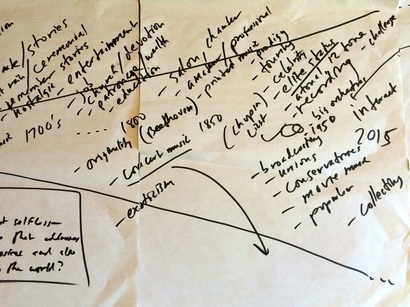|
Regarding the role(s) and relevance of professional musicians in society... where are we with this in 2015? During our first meeting in Providence, we collaboratively constructed a (highly subjective and likely terribly inaccurate) historical timeline of Classical Musicians, from the Stone Age (approximately) to the current day. My thought was that zooming all the way out would give us enough perspective to help us see the evolution more clearly.
While the landscape has become incredibly rich and diverse, the same basic things that humans needed from music and musicians back in the Stone Age (or thereabouts) are surely still valuable today. In Providence, we brainstormed the following: celebration, ceremony, entertainment, storytelling, remembering, group cohesion... With the exception of entertainment (and hopefully making meaning and finding emotional fulfillment) for a decidedly niche audience, which of these important--even essential--community functions do professional musicians regularly fulfill in 2015? I should note here that I'm referring specifically to Classically-trained musicians. What happened in our history that allowed professional musicians to become so divorced from the expectation of being responsive to the needs of their neighbors? There's never been a time with greater access to becoming a professional musician. Yet that increased opportunity to pursue a life as an artist doesn't correlate with an increase in relevance and value to society at large. In fact, given the trend lines for racial and ethnic demographics in the US, one can speculate that this disconnect with professional Classical musicians will only increase. Given this cultural context, how do we go about encouraging individual artistic passions while also figuring out how to meet a real need, serve an important purpose, become relevant (again)?
0 Comments
Your comment will be posted after it is approved.
Leave a Reply. |
AboutSharing student project documentation and, more recently, my own. Archives
June 2022
Categories |

 RSS Feed
RSS Feed
